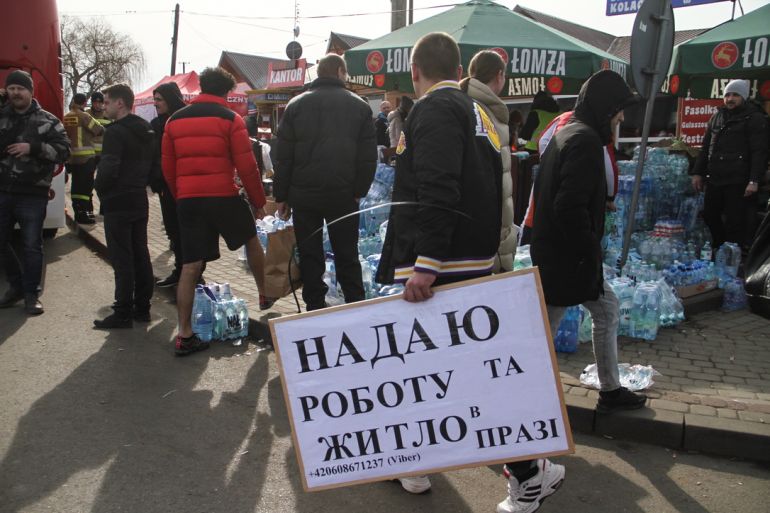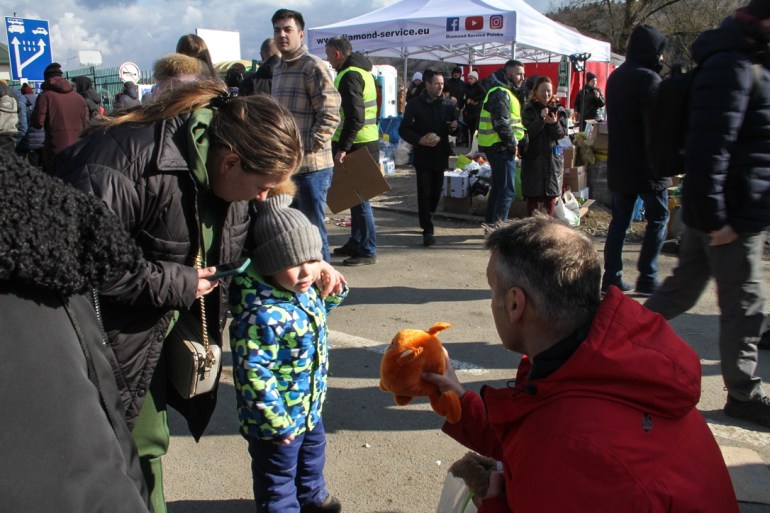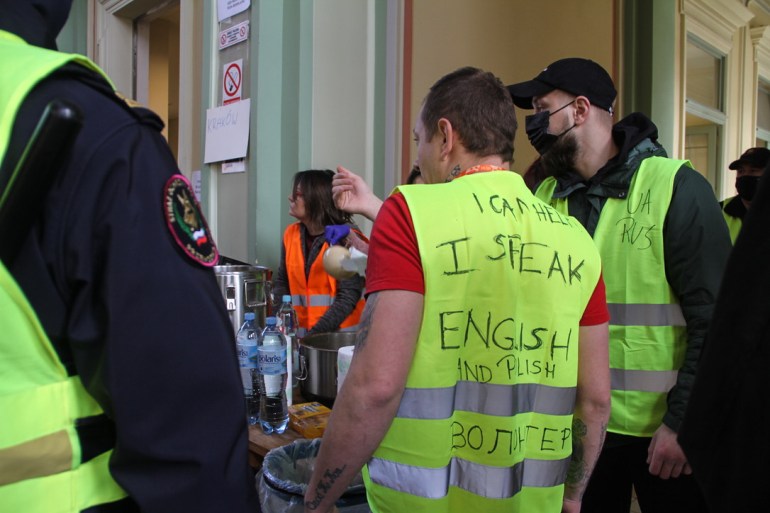Refugee aid campaigns mushroom in Poland, but tests lie ahead
About 800,000 refugees have crossed into Poland since the war in neighbouring Ukraine began.

Kroscienko, Poland – Jaroslaw Perzynski has not slept for 30 hours. Ever since the beginning of the war last week in Ukraine, the mayor of Sierpc – a small Polish town of 17,000 people – has been devoting most of his time gathering warm clothes, food and water for refugees crossing into Poland.
At the border crossing in the town of Kroscienko, Perzynski walks between the groups of refugees and hands in toys and drawings donated by the children of Sierpc to the children arriving from the other side of the frontier. The rest of his city council staff unpack the 10 tonnes of items they have brought to the border from the town in central Poland.
Keep reading
list of 4 itemsHungary’s Orban defends response to Ukraine war refugees
1 million refugees flee Ukraine in fastest exodus this century
Non-Ukrainian refugees recount their long journey to Poland
“People donated many things. Children brought toys and cards for Ukrainian children, it’s incredible,” Perzynski says, tears filling his eyes. “People want to help and they need to help because one day we might be in the same situation. This is our responsibility.”
Since the outbreak of the war, almost 800,000 refugees have crossed into Poland. In Kroscienko, hundreds of cars stand along a narrow road, waiting for the arrival of more refugees from Ukraine, whose lives have been brutally disrupted by the Russian invasion.

Poland, a conservative country which several years back refused to accept the resettlement of refugees from other European Union countries, is now at the front line of humanitarian efforts for refugees fleeing Ukraine.
Individuals from all across the country have taken to the border to offer refugees free transport and accommodation. Groups of volunteers at each border crossing welcome new arrivals with food, tea and water. On social media, thousands of people, including the country’s celebrities, offer free accommodation.
Fundraising campaigns have mushroomed, too, as have a number of aid initiatives launched around the country. Some offer evacuation of animals stuck in Ukraine. Others organise techno parties and concerts of Ukrainian music, with all proceeds donated to help refugees. Lawyers offer free legal help and computer shops free repairs for people who want to donate their equipment to Ukrainians.
‘Beautiful to witness’
Ahmed, an 18-year-old from South Africa, arrived in Ukraine’s capital, Kyiv, two days before the war began on February 24. He went to visit his father whom he had not seen in 12 years. When the war began, the two embarked on an arduous journey towards the Polish border.
“There were four or five checkpoints at the border. I walked into a police station in Poland and the first thing the guard said was not even, ‘Hello’. It was, ‘Are you hungry?’,” said Ahmed.
“Polish people, guards are absolutely excellent. It was beautiful to witness.”
The openness of Polish law enforcement bodies has come as a surprise to individuals and groups who have been supporting migrants and refugees in Poland.
Since last September, when a migration crisis at Poland’s border with Belarus began, the Polish guards have ruthlessly pushed migrants back across the border to prevent them from reaching the country.
A special restricted zone was meanwhile established along the Belarusian border where neither humanitarian aid groups nor journalists could operate freely. Hundreds of asylum seekers, mainly from Iraq, wandered the woods of the Polish-Belarusian borderland looking for shelter. Some did not make it – and the crisis is far from over.

But following the outbreak of war in Ukraine, the political mood has changed. Anyone can cross from Ukraine into Poland regardless of their nationality and what documents they hold, while authorities are preparing for the presence of refugees in the long run.
For the moment, however, the organisation of humanitarian aid has been mostly addressed by individuals and ad hoc initiatives. And if the refugees are to stay in Poland, the country needs a more coordinated approach.
“There are about 80 or 90 NGOs who are now working on proper coordination of aid and allocation of responsibilities. We are trying to decide who will help at which border crossing, who in the cities, who will take care of legal issues and who will focus on education. It takes time,” says Anna Alboth, from Grupa Granica, a coalition of NGOs that have been supporting refugees since the Belarusian border crisis last year.
“At some border crossings, food is getting wasted because there is not enough people coming. I am sure that refugees will have a temporary accommodation and something to eat in the beginning. What I worry about is what will come next.”
According to Alboth, the issues of employment and education will provide a real test for those in the refugee support sector and the Polish government.
Poland will need Ukrainian teachers so that refugee children can study in their own language, while the question of the availability of equipment in schools, including computers, will also have to be addressed. Finding qualified personnel who can translate documents and professional diplomas will be another challenge.
“There will be a huge mess and we already see that many people do not understand what staying in Poland will entail. A huge campaign is needed to inform people about their status, their rights – and Poland still has not addressed it,” Alboth said.
“Poland’s response to the crisis has been incredible, there is no area where people would not be organising some forms of aid. It is great and I hope it will stay like this for a long time. But we also have to make sure that the help is well-organised. We don’t want to burn out too soon.”
![a volunteer tent with the most necessary products for refugees arriving from Ukraine. Kroscienko, Poland [Agnieszka Pikulicka-Wilczewska/Al Jazeera]](/wp-content/uploads/2022/03/humanitarian-aid-5.jpg?w=770&resize=770%2C513)